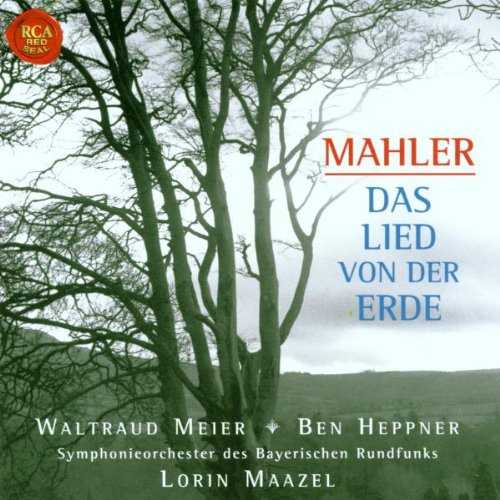
Composer: Gustav Mahler
Performer: Ben Heppner, Waltraud Meier
Orchestra: Symphonie Orchester des Bayerischen Rundfunks
Conductor: Lorin Maazel
Audio CD
SPARS Code: DDD
Number of Discs: 1
Format: FLAC (tracks+cue)
Label: RCA
Size: 232 MB
Recovery: +3%
Scan: no
01. I. Das Trinklied vom Jammer der Erde
02. II. Der Einsame im Herbst
03. III. Von der Jugend
04. IV. Von der Schönheit
05. V. Der Trunkene im Frühling
06. VI. Der Abschied
Remarkable Synthesis of Song Cycle and Symphony
With Das Lied Von Der Erde (The Song of the Earth), perhaps more than any other, Gustav Mahler succeeded in a task he had been attempting his entire career, blending the intimate world of the song cycle with the vast rhetoric and structure of the symphony. Only a very few works even attempt such a feat–most notable of these are Mahler’s own Ruckert Lieder and Kindertotenlieder and Richard Strauss’ Four Last Songs. That all of these works take as their subject matter the bittersweet pain of love and loss is only partially due to the Gothic affinities of the late Romantic period. Heroic narrative tales are probably inappropriate for such a synthesis, as they lend themselves more readily to opera or cantata. But simple love poems, on the other hand, are perhaps not sufficiently deep to warrant full symphonic treatment. In Das Lied Mahler adapts German paraphrase poems loosely based on Chinese texts of the Tang Dynasty, selecting and revising material for six movements. These texts represent, as the notes tell us, “a deeply personal vision from the threshold that bounds human life.” They are retrospective, though–not at all an anticipation of an afterlife, but instead primarily a gentle look back at life lived fully. After the bravado of the first movement the cycle reconciles with loss, coming to acceptance rather than ending with heartrending grief.
The depth of tone and controlled vibrato of soprano Waltraud Meier voice’s match the musical requirements perfectly. She and the robustly voiced tenor Ben Happner sing beautifully in this rendition performed by the Bavarian Radio Orchestra directed by Lorin Maazel That Mahler set the songs for both male and female voice alternating movements is another unique feature of this piece; the technique removes the text from a single viewpoint and makes it much more universal. The orchestra, too, is an equal partner–it is not delegated to mere accompaniment, but provides lovely counterpoint to the voice. The voice no longer sings only the tune. Sometimes, in a more operatic, even Wagnerian conception of vocal writing, the singer presents an obbligato, often fragmented, over the orchestral melody.
The third movement, Von der Jugend, demonstrates how the late romantic conception of song developed from Schubert’s time. The song is essentially strophic–that is, it consists of a single melody presented several times with different words. Schubert, in his strophic settings, would usually repeat the melody and accompaniment exactly, without change. Mahler, on the other hand, uses a technique of continuous development, in which motives are more important than entire themes. Furthermore, all the aspects of music contain potential for variation–the instruments may be changed the second time through, the dynamics varied, the melody ornamented or simplified, the harmonies changed or enriched, even the tempo may be changed. A new melody may be overlaid on top of the old theme. This difference in technique means that while Schubert is primarily concerned with capturing the overall emotional tone of the poem, Mahler can respond to smaller, less structural changes in mood. For Mahler, the musical essence is found in discovering the mood of a single stanza, or perhaps even a single word. Indeed, there is a pervasive use of text painting–birds flutter in violins and flutes whenever the word “vogel” is sung; and the inevitable descent into death is portrayed through descending melodic lines.
This is an excellent performance that I recommend highly–my only qualm is about the rather poor English translation of the text.
i’ll give it a chance – but to my opinion there is no better way than
Wunderlich – Christa Ludwig – Klemperer.
And sound engenieer of this recording was brilliant too.
Thanks